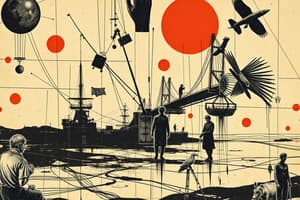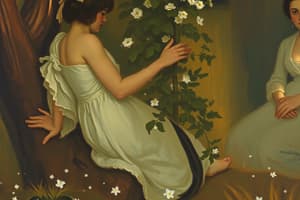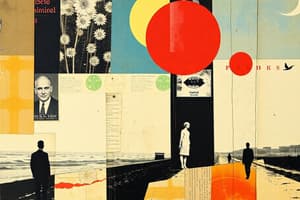Podcast
Questions and Answers
Which of the following is an additive process in three-dimensional art?
Which of the following is an additive process in three-dimensional art?
- Assembling
- Modeling (correct)
- Casting
- Carving
What is the distinguishing factor of three-dimensional art?
What is the distinguishing factor of three-dimensional art?
- The use of smooth surfaces
- The use of brushes
- The use of colors
- Actual and real depth, with height, width, and depth (correct)
Which of the following is a subtractive process in three-dimensional art?
Which of the following is a subtractive process in three-dimensional art?
- Modeling
- Assembling
- Carving (correct)
- Casting
What is the process of constructing a sculpture using different materials called?
What is the process of constructing a sculpture using different materials called?
Which of the following is an example of technological media in art?
Which of the following is an example of technological media in art?
What is the process of creating shapes using soft, pliable materials and manual or machine force called?
What is the process of creating shapes using soft, pliable materials and manual or machine force called?
Which of the following is NOT a function of art according to the text?
Which of the following is NOT a function of art according to the text?
What does the term 'integrity' refer to in the context of art?
What does the term 'integrity' refer to in the context of art?
Which of the following is an example of a two-dimensional art form mentioned in the text?
Which of the following is an example of a two-dimensional art form mentioned in the text?
What does the term 'representational' refer to in the context of art?
What does the term 'representational' refer to in the context of art?
Which of the following is NOT mentioned as a source of artistic expression in the text?
Which of the following is NOT mentioned as a source of artistic expression in the text?
What does the term 'radiance or clarity' refer to in the context of art?
What does the term 'radiance or clarity' refer to in the context of art?
Flashcards are hidden until you start studying
Study Notes
Art Processes
- Drawing: moving an instrument over a smooth surface to leave a mark
- Painting: applying colors to surfaces using paint brush, painting knives, or rollers
- Three-dimensional art: has actual and real depth, with height, width, and depth
Sculpture Techniques
- Assembling: constructing a sculpture using different materials
- Modeling: additive process where the artist adds material to build the form
- Carving: subtractive process where parts of the solid mass are removed to create the form
- Casting: manipulative process using soft pliable materials, made into shapes using manual or machine force
Technological Media
- Photography: capturing optical images on light-sensitive cameras
- Computer Arts: graphic designers use computers and applications to create art
Elements of Art
- Dot: the most basic visual element with no dimension
- Line: an identifiable path created by a point moving in space
- Types of Lines: Vertical, Horizontal, Diagonal, Curved, Jagged
- Vertical line: depict power, strength, stability, simplicity, poise, or stature, and dynamism
- Horizontal line: associated with rest and repose
- Diagonal lines: lines of action and movement
- Curved Lines: considered as “line of grace” and “line of beauty
- Jagged lines: associated with pointed and sharp objects
- Shape: has two dimensions, height and width, defined by lines
- Geometric Shape: has mathematical perspective, can be Rectilinear and Curvilinear
- Organic Shape (biomorphic): free-flowing, informal, and irregular, often seen in nature
- Form: exists in three dimensions with height, width, and depth
- Space: the surface or area within the artwork
- Color: reflected light, organized on a color wheel with 3 primary colors, 3 secondary colors, and 6 intermediate colors
- Properties of Color: hue, intensity, primary colors, value
- Hue: name of a color
- Intensity: brightness or dullness of a hue or colors
- Value: lightness or darkness of a hue (color)
- Primary Colors: hues that can be mixed to create all other colors
- Secondary Colors: combination of equal amount of two primaries
- Tertiary Color: created by mixing primary and secondary colors
- Movement: adds excitement to the artwork, showing action and directing the viewer's eye
Functions of Arts
- Personal: self-expression or for entertainment
- Social: used for public display and celebration, affects collective behavior
- Physical: utilitarian, useful or functional
- Integrity: faithfulness to one's principles
- Proportion or consonance: balance or consistency of the elements
- Radiance or clarity: has something to do with the meaning or impact upon the observer
Subject of Art
- Anything that is represented in the artwork, can be a person, object, scene, or event
- Representational: artworks that depict something real and part of this world
- Non-representational: artworks that have no resemblance to real subjects or objects or anything from nature
Sources of Artistic Expression
- Nature and the environment
- People and World Events
- Myths and Legends
- Spiritual and Religious Beliefs
- Ideas Commissioned by Employers
Studying That Suits You
Use AI to generate personalized quizzes and flashcards to suit your learning preferences.




